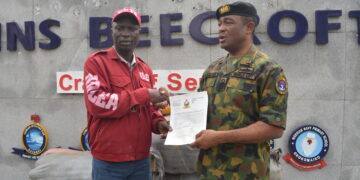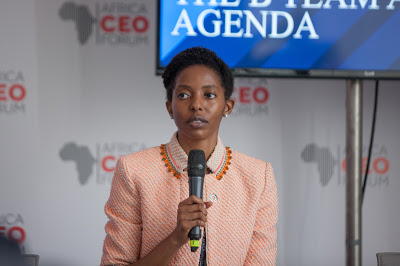The Africa Continental Free Trade Area (AfCFTA) agreement should serve the best economic interest of Africans through development of manufacturing with a ripples effect of job creation and easier
flow of goods across countries.
flow of goods across countries.
Dr. Amy Jadesimi, the managing director of the Lagos Deep Offshore Logistics Base (LADOL), expressed that view in an interview with the Financial Times, as contained in a statement in Lagos by LADOL’s Spokesman, Olakunle Kalejaiye.
Of important note is the fact that though Nigeria is seen as a big economy, with capability to support other smaller countries in trade issues, President Muhammadu Buhari, heeded calls from the nation’s labour
and manufacturing trade groups to be sure of how the agreement would benefit Nigeria’s economy before signing the deal.
and manufacturing trade groups to be sure of how the agreement would benefit Nigeria’s economy before signing the deal.
Therefore, expressing support for the President’s approach to scrutinizing how the agreement would benefit Nigeria’s economy, Jadesimi said the pact should encourage massive manufacturing, a foundation for industrailisation.
She said: “We need a continental-focused solution that is developed by the African Union, and targets making the trade agreement a mechanism for local industrialisation.
“That should be the aim of this trade agreement, rather than just something broad and high level about economic growth or prosperity — those things won’t come if, underlying all of this, we do not create jobs and lift our economies through industrialisation.”
Although there are arguments that such agreement as the AfCFTA has the potential to spur economic growth in a bloc of nations with a combined gross domestic product of more than $3 trillion, creating the world’s largest free trade zone, Jadesimi wants attention given to likely challenges, like if the situation is not properly managed it could turn the continent into a dumping ground for cheap Chinese, US or European goods.
“Are we going to create an entirely new paradigm for trade, that is Africa-centric, that is controlled by African countries, and that dis-incentivises foreign companies and countries outside of the continent from importing — are we going to do that? That’s going to be really tricky,” Jadesimi said.
The African Union summit in Niger in July was a landmark moment for the pact whose roots stretch back decades. Although the deal officially came into force on May 30, the implementation of any final agreement is at least three years away and specifics on everything from rules of origin to intellectual property must be agreed between a diverse groups of largely fragmented economies.
The agreement must also contend with a history of regional trade agreements that have largely flopped and done little to bolster trade integration — the AfCFTA will need to be harmonised with eight such regional pacts.
There are views that beyond the issue of whether the costs of an open market outweigh the benefits to specific countries, there is also the question of whether it is possible for Africa to overcome its structural challenges to trade.
While it may look good for trade that the agreement aims to remove 90 per cent of tariffs to create a single market with free movement of goods and services, analysts also raised concerns of how under-resourced government would cope with raising funds to upgrade poor infrastructure, considering that they would have been deprived of tariff revenue.

































































